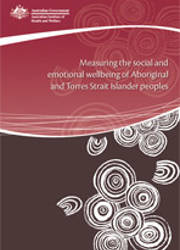Summary
Defining and measuring social and emotional wellbeing
The concept of social and emotional wellbeing that underpins the analyses in this Report attempts to capture an Aboriginal and Torres Strait Islander holistic and whole-of-life view of health. It includes mental health, but also considers the impact of other factors on emotional well being, such as life stressors, removal from family, discrimination and cultural identification.
Until recently, the majority of national data on the social and emotional wellbeing of Aboriginal and Torres Strait Islanders centred on the use of mental health services.
The interim social and emotional wellbeing module was developed to collect national data on this topic in the 2004-05 National Aboriginal and Torres Strait Islander Health Survey (NATSIHS).
The interim module has eight domains - psychological distress, impact of psychological distress, positive wellbeing, anger, life stressors, discrimination, cultural identification and removal from natural family.
This report provides current national data on the social and emotional wellbeing of Aboriginal and Torres Strait Islander peoples, reviews the effectiveness of the interim social and emotional wellbeing module, and makes recommendations for improving measures of social and emotional wellbeing.
The social and emotional wellbeing of Indigenous Australians
Key findings from the 2004-05 NATSIHS were:
- Over one-quarter (27%) of Indigenous adults reported high or very high levels of psychological distress.
- Indigenous Australians were twice as likely to report high or very high levels of psychological distress as non-Indigenous Australians.
- Almost one in 10 Indigenous Australians had visited a doctor or health professional in the 4 weeks prior to interview due to feelings of psychological distress.
- In relation to life stressors, four in 10 Indigenous adults indicated that they or their family or friends had experienced the death of a family member or close friend in the previous year, 28% reported serious illness or disability and 20% reported alcohol-related problems.
On the other hand:
- Over half of Indigenous adults reported feeling calm and peaceful (51%) and/or full of life (55%) all or most of the time.
- Nearly three-quarters (71%) reported being happy in the last 4 weeks.
Other data sources also indicated that Aboriginal and Torres Strait Islanders have poorer social and emotional wellbeing than non-Indigenous Australians:
- The rate of community mental health service contacts for Indigenous people was more than twice that for non-Indigenous people.
- Aboriginal and Torres Strait Islander people were twice as likely to be hospitalised for intentional self-harm as non-Indigenous people.
Improving measures of social and emotional wellbeing
This report found that the interim module performed well and all eight domains should be retained, with some modifications required to five of the domains. The report recommends that the feasibility of defining and measuring a number of additional concepts (self-efficacy, resilience and identity, isolation and loneliness, and social wellbeing) should be further explored.
The AIHW has been funded to undertake some of this work in a second report on Indigenous social and emotional wellbeing that considers the concepts of self efficacy, resilience and identity, and social wellbeing. NACCHO is responsible for considering the concepts of isolation and loneliness in a separate report.
Preliminary material: Acknowledgments; Acronyms; Symbols used
-
Introduction
- What is social and emotional wellbeing?
- Development of the interim social and emotional wellbeing module
-
Data on the social and emotional wellbeing of Indigenous Australians
- Psychological distress
- Impact of psychological distress
- Positive wellbeing
- Anger
- Life stressors
- Discrimination
- Cultural identification
- Removal from natural family
-
Internal validation of the interim social and emotional wellbeing module
- Validating the domains against each other
- Validating the domains against other variables
-
Findings from other data sources
- National Hospital Morbidity Database
- National Community Mental Health Care Database
- Supported Accommodation Assistance Program National Data Collection
- Commonwealth State/Territory Disability Agreement National Minimum Data Set
- Bettering the Evaluation and Care of Health Survey
- Western Australian Aboriginal Child Health Survey
-
Stakeholder workshop on the interim module
- Assessment of the eight domains of the interim module
- Additional areas to explore
- Other outcomes of the workshop
-
Conclusions and recommendations
- Overall assessment of the eight domains
- Recommendations
Appendixes
- Social and emotional wellbeing module - additional information
- Administrative data and other surveys - additional information
- Technical notes
- Chapter 2 detailed tables and confidence intervals (156KB PDF) | (2.24MB RTF)
- Chapter 3 detailed tables and confidence intervals (626KB PDF) | (10.58MB RTF)
- Chapter 4 detailed tables and confidence intervals (99KB PDF) | (724KB RTF)
End matter: List of tables; List of figures; References



